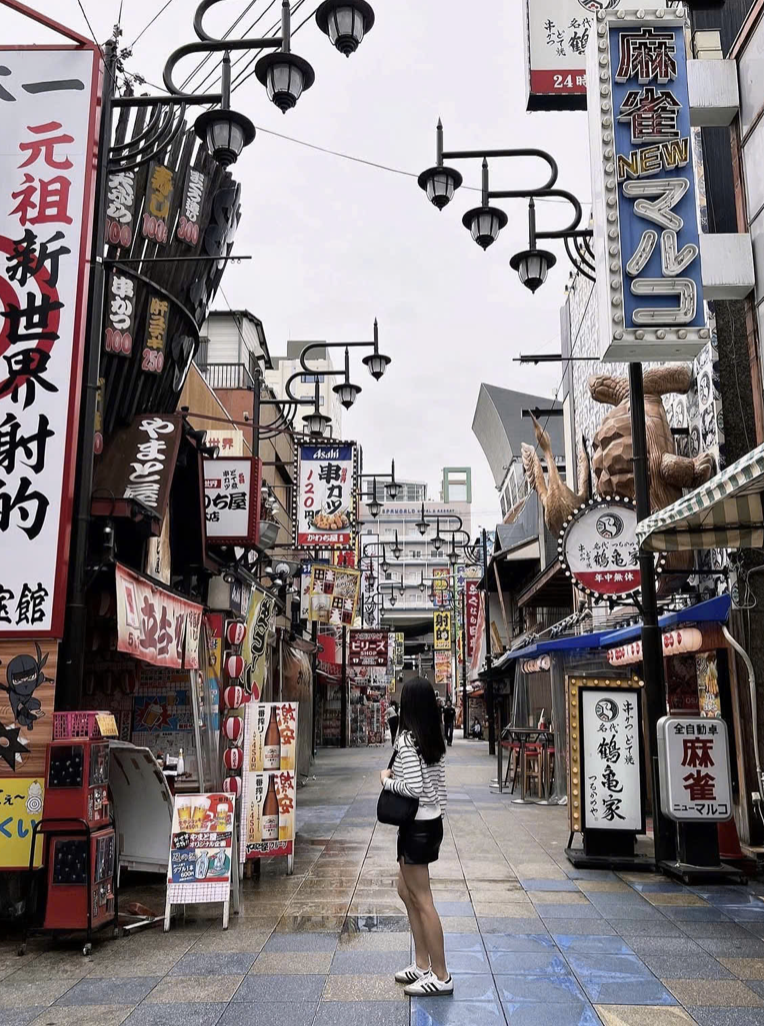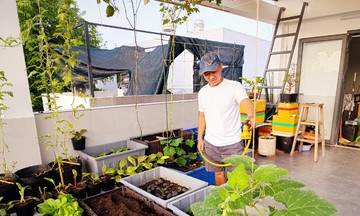28-year-old Minh moved to Japan in 2023 to work in construction. To combat homesickness, he often invited 6 fellow Vietnamese over for meals and conversation on weekends.
The first time they sang karaoke for about 10 minutes, the police knocked on his door. The group was questioned, briefed on neighborhood rules, and warned about noise levels.
The second time, the police returned because someone in the group laughed loudly, disturbing a neighbor's sleep. The third time, they appeared when Minh was assembling a shelf, irritating someone nearby. Even after trying to be quiet, subsequent incidents occurred, with even normal conversations between two people leading to complaints. "I was shocked that even at a moderate volume, we were still reported," Minh said.
He realized noise is a major sensitivity for the Japanese. His neighbors, an immigrant family with a small child, even received police visits when the baby cried at night.
 |
Thu Ha in Tokyo, Japan, 5/2025. Photo: Provided by the interviewee |
For Thu Ha, 30, from Nam Dinh, the complexities of Japanese garbage disposal posed a different challenge. Upon moving into her Tokyo apartment, she received a booklet dozens of pages thick explaining the process.
Japanese household waste is divided into four categories: burnable, non-burnable, recyclable, and oversized. Each has a specific collection schedule. Trash must be placed at the designated area before 9 PM. Incorrect disposal or placing trash in another neighborhood's area can result in fines. Ha often found herself returning indoors with her trash bag after realizing it wasn't the correct collection day. She once carried an empty plastic bottle around for hours, unable to find a public bin, and eventually had to take it home.
Garbage sorting instructions are posted everywhere in residential areas and on streets. For plastic bottles, Ha had to remove the cap and label (placing them in the burnable category) and keep only the body for recycling. Cans and bottles had to be rinsed to prevent residue and odor. "I never imagined taking out the trash could be so complicated," she said.
Quang Minh and Thu Ha exemplify the challenges of adapting to life in Japan. According to research published in PubMed Central (PMC), 45% of foreigners experience adjustment disorders due to Japan's strict social rules. Approximately 69% report significant pressure to avoid inconveniencing locals.
Asian immigrants often adapt less easily than Western or Latin American students. Japanese culture emphasizes independence and discipline, while many Asian cultures prioritize collectivism. Actions considered normal elsewhere, like speaking loudly in public, casual attire, or improper garbage sorting, can be seen as disruptive in Japan, where meticulousness and adherence to rules are highly valued.
Online groups like "Vietnamese Mothers in Japan" and "Vietnamese Community in Japan," with hundreds of thousands of members, feature numerous posts about accidental rule violations, attracting thousands of comments. TikTok videos demonstrating garbage disposal or noise violation penalties garner millions of views and thousands of comments, fostering empathy and shared learning.
Doctor Nguyen Hong Son, President of the Vietnam Union of Friendship Organizations in Japan, emphasizes the importance of learning and adhering to social rules for smooth adaptation and a stable life in the new environment.
Currently, there are approximately 620,000 Vietnamese people in Japan, making them the second-largest foreign community, concentrated in Tokyo, Aichi, Osaka, Fukuoka, and Saitama. Consequently, cultural clashes are increasingly common.
"Some behaviors perfectly normal in Vietnam are considered major offenses in Japan," Son said. For example, Vietnamese often display their national flag as a sign of community, which, while not illegal, can be perceived negatively by some Japanese.
Journalist Murayama Yasufumi, who has visited Vietnam 60 times and is familiar with both cultures, acknowledges that some Vietnamese behaviors might surprise the Japanese, but are essentially just differences in customs. He notes that Japanese people are particularly sensitive to rules and etiquette, prioritizing respect for the individual, while Vietnamese culture emphasizes unity, pride, and patriotism. "These differences can sometimes lead to conflict," Murayama said.
From a Vietnamese perspective, Associate Professor Doctor Pham Ngoc Trung, from the Academy of Journalism and Communication, believes that the strictness of Japanese social rules, communication, and lifestyle helps Vietnamese immigrants develop discipline, become more meticulous, and adopt a more civilized approach.
"From properly disposing of garbage to maintaining quiet in public spaces, these practices gradually cultivate a sense of community, promote collective living, and foster many positive qualities," Trung said.
 |
Le Van Lam hung 300 flags in Aichi Prefecture, Japan, 9/2025. Photo: Provided by the interviewee |
Le Van Lam, 30, from Aichi Prefecture, learned that fluency in Japanese and showing respect for locals are key to avoiding trouble and culture shock. Every year on September 2nd, he asks his landlord for permission to hang the Vietnamese flag in commemoration, explaining its significance as a symbol of gratitude for past generations who sacrificed for Vietnam's peace.
This year, he hung 300 small flags in his garden without any negative reactions. Curious Japanese passersby inquired about the flags, and after Lam's explanation, they smiled, nodded, and even visited his garden.
Nga Thanh - Ngoc Ngan












